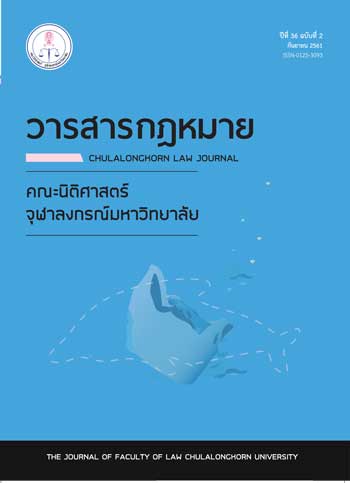Important Legal Principles regarding Trusts for the Purpose of Personal Property Management in England
Main Article Content
Abstract
On 10th July, 2018, the cabinet approved a draft bill on trusts for the purpose of private assets management. The bill will be the second piece of legislation on trusts since the coming into force of section 1686 of the Civil and Commercial Code, which negates any legal effect of the establishment of a trust, directly or indirectly, by will or any other juristic act committed during the lifetime of the settlor or after his death, except by a specific law enacted for the purpose of allowing the creation of trusts. The first piece of legislation, the Trust for Transactions in the Capital Market Act B.E. 2550, introduced trusts as an investment tool to increase the efficacy of the fund raising process in the capital market. On the contrary, the remit of the new bill will be the management of private property, and will be different from the Act in various aspects. The content of the bill reflects a legal borrowing of the English trust law concepts. Accordingly, the article aims to discuss and explain fundamental principles of English trust laws relevant to the management of personal property, with the hope that it will be useful for the future development of trust law in Thailand.
Article Details
The copyright in this website and the material on this website (including without limitation the text, computer code, artwork, photographs, images, music, audio material, video material and audio-visual material on this website) is owned by Chulalongkorn University Law Journal and its licensors.
1. Chulalongkorn University Law Journal grants to you a worldwide non-exclusive royalty-free revocable license to:
- view this website and the material on this website on a computer or mobile device via a web browser;
- copy and store this website and the material on this website in your web browser cache memory; and
- print pages from this website for your use.
- All articles published by Chulalongkorn University Law Journal are licensed under the Creative Commons Attribution 4.0 International License. This permits anyone to copy, redistribute, remix, transmit and adapt the work provided the original work and source is appropriately cited.
2. Chulalongkorn University Law Journal does not grant you any other rights in relation to this website or the material on this website. In other words, all other rights are reserved. For the avoidance of doubt, you must not adapt, edit, change, transform, publish, republish, distribute, redistribute, broadcast, rebroadcast or show or play in public this website or the material on this website (in any form or media) without appropriately and conspicuously citing the original work and source or Chulalongkorn University Law Journal prior written permission.
3. You may request permission to use the copyright materials on this website by writing to journal@law.chula.ac.th.
4. Chulalongkorn University Law Journal takes the protection of its copyright very seriously. If Chulalongkorn University Law Journal discovers that you have used its copyright materials in contravention of the license above, Chulalongkorn University Law Journal may bring legal proceedings against you seeking monetary damages and an injunction to stop you using those materials. You could also be ordered to pay legal costs.
If you become aware of any use of Chulalongkorn University Law Journal's copyright materials that contravenes or may contravene the license above or any material on the website that you believe infringes your or any other person's copyright, please report this by email to journal@law.chula.ac.th.


